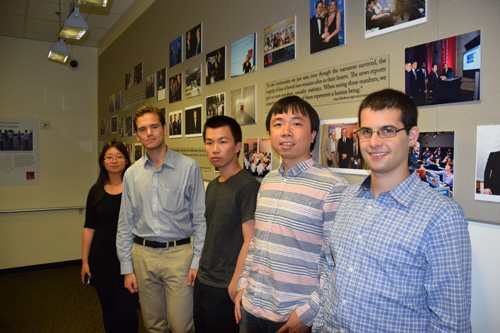Mathematics Undergraduates Develop Information Retrieval in IWitness for Annual UCLA Summer Program


(L-R: Lingxi Zhou, Mateo Wirth, Qiaoyu Yang, Bin Bi, Ilan Morgenstern Kaplan)
Some of the brightest college students in applied mathematics are working with the USC Shoah Foundation this summer for the annual Research in Industrial Projects (RIPS) program at the UCLA Institute for Pure and Applied Mathematics (IPAM).
Each summer, undergraduate students from around the world convene at UCLA for the two-month program. They are placed in small groups, and each group must find a solution to an applied mathematics problem within the sponsor organization they are assigned. Past sponsors have included Intel, HRL and the Los Angeles Police Department. At the end, they present their findings to the organization. This is the fifth year the USC Shoah Foundation has participated in RIPS.
USC Shoah Foundation technology staff have asked their RIPS group this year to experiment with ways to link videos in IWitness, USC Shoah Foundation’s interactive educational website, to other archives – for the purposes of their project, the group will work with Wikipedia. In other words, each video would link automatically to a relevant Wikipedia page, providing another avenue of research and learning for students using IWitness.
Bin Bi, a PhD candidate in computer science at UCLA, is mentoring the four students assigned to the USC Shoah Foundation: Ilan Morgenstern Kaplan (Instituto Tecnologico Autonomo de Mexico), Mateo Wirth (Princeton), Qiaoyu Yang (Reed College), and Lingxin Zhou (Rutgers University New Brunswick/Piscataway).
Bi said the project is an example of “information retrieval,” or what search engines do: find relevant information from a database in response to a query. However, the group is relying on the indexing terms in IWitness instead of user queries that would provide feedback, which makes their assignment unique. It’s a task on the cutting-edge of the field, Bi said.
“This is the most challenging problem in information retrieval,” Bi said. “This is what Google does.”
Over the past three weeks, the group has been learning programs that will help them with the project, including SQL and Python. Kaplan, the project manager, said each team member will explore different methods and the group will come together to figure out which one works best.
Yang said the project is “very different” from the pure math he’s used to. “But it’s kind of exciting,” he said.
Kaplan said he is excited to have a hand in improving the IWitness experience. Their project will offer an easily-accessible source of information to guide students’ learning while they watch testimony.
“They’ll have the information right next to them, inspiring them to read more for themselves,” he said.
The group will present their findings to staff of the USC Shoah Foundation next month, and depending on the success of their research, their system may eventually be put into production. Bi has high hopes for his team.
“I hope their method can be implemented as a real product and can be used by researchers,” he said.
Like this article? Get our e-newsletter.
Be the first to learn about new articles and personal stories like the one you've just read.